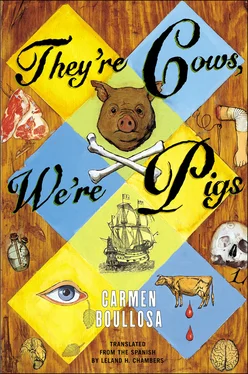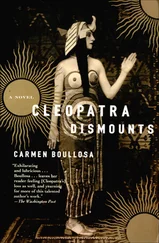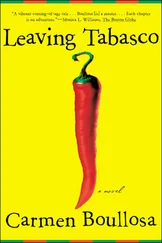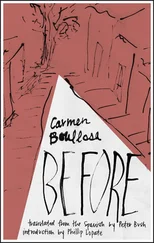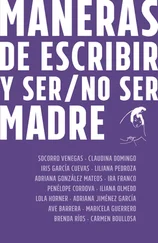Will I be able to continue this story without the heart of Smeeks, Le Trépaneur, Exquemeling? Could his eyes and ears endure the shock of the pirate’s life without going blind or deaf? I think instead that I should divest myself of all three — eyes, ears, and heart — and in order to describe how life is among the pirates, I should stick with the only weapon given me by le Nègre Miel when he died, when I promised to keep his memory throughout the eternity of mankind; because eyes and ears will be overwhelmed by blood and violence, and heart will not get us anywhere, going around in circles, incapable of following the order of time because for it time does not exist, events intertwine, come together, or are incompatible because all things remain subject to the law of violence, hatred, revenge, disorderliness, blood, and death.… I will be able to count on my memory alone in proceeding with my story. From this moment on, Le Trépaneur almost daily would be stained with the blood of those limbs half torn away by cannon shot and that he would have to remove completely — I, Le Trépaneur, sawing off so many limbs that I would be able to put together a large army with those that had been removed … an army as cruel and invincible as the one the pirates formed at that time, because the remaining limbs would take on names which would be used later on in the fighting by whoever possessed them:
Exterminator
Braconneur
Passe-pour-tout
En Rade
Stonebreaker
Wingy
Razor
Screamer
Slow Fuse
Naked Sword
Feu-de-joie
et cetera, et cetera
Unless, perhaps, I have not already used more than memory in relating what I have set down.

The following morning, recovered from and with the help of the feasting and from and with the help of the drinking, L’Olonnais ordered the first squadron to inspect the neighboring areas. He did not wish to make use of the Indians on land, and he left them as our rear guard at the lake and in the gulf. Fifty men went out to find someone, anyone at all, in order to discover where all the people of Maracaibo were, but their persistence was futile. Even though they did find a small group and tortured them all, and even though he had one of them hacked to pieces in front of the others, threatening them with the same fate if they did not reveal where their riches were and where the other citizens had gone to, the most he was able to get was directions to another place, and he ordered his men to go there quickly — only to verify that it had already been abandoned ( they having the plains and as a nearby shelter the fortified city ), upon which he ordered the attack on Gibraltar, a town not far distant.
Many of the two thousand people of Maracaibo had taken refuge in Gibraltar, but just as many others, the men above all, fled the latter town every day, terrified that because of the fearful interrogation methods used by L’Olonnais, someone might betray them; so that, just like animals, they distrusted their fathers, their brothers, their children, digging a new hole for themselves every day, suffering hunger and thirst; while we freebooters were enjoying the benefit of their munificent homes and larders. But for L’Olonnais, enjoying merely what they had left behind (of which there was much, a great amount of loot) was not sufficient. He wanted everything; and more than anything else, he wanted them , and he wanted to fight. So that two weeks after having landed, we turned toward Gibraltar, loading part of the loot on board together with the few prisoners we had been able to take, and leaving a prudent force in Maracaibo to cover our return. We disembarked a few leagues from the town, near La Ribera. One of the Bravos showed us the way. All worked up, well fed, our knapsacks filled with good provisions and very little alcohol running through our veins, and possessed by a strange mood of childish joy, we seemed like something more than pirates. To take possession of the city without having to struggle for it, to be enjoying the loot without bloodshed, had quickened our blood. Up until the moment of leaving Maracaibo we had not lost a single one of our own men, and we had neither sick nor wounded; though on the road some began to show signs of having contracted a strange fever, but they pretended not to have anything wrong and we pretended not to notice how weak they were. For several days we had been lords while staying in Maracaibo without having fought for it; we had eaten at their tables, the very tables of the previous lords, without having bloodied our hands to do so! So we scarcely gave a thought to the terrible road that would take us to Gibraltar, on the southern part of the lake, where the land became more swampy. The closer we got to Gibraltar, the more nervous the Bravo guide became, as if something odd had happened, or were about to happen, although L’Olonnais interpreted his nervousness as due to the fact that he was plotting something against us, that he was going to plunge us into an affair that would be our ruin; but it was impossible for us to talk to him and discover if he was betraying us because he spoke nothing but his mother tongue. But only by L’Olonnais was the Indian’s agitation noticed. The rest of us paid no attention to him, although had it not occurred to us that he was guiding us in error, deceived as we were by a false path the Spaniards had built to entrap us, we would not have awakened in time from so pleasant a sensation, and perhaps we would have lost the battle.
Because suddenly the road we were walking on became so soft to our step that we sank into it, and in our confusion we did not know what to do with our feet, where to put them; but the Indian, without the least hesitation tearing branches from the palms and other trees and casting them beneath his feet, urged us with signs to do the same; and although we saved ourselves from drowning in the fetid mud, for a short while we thought nothing was going to keep us from burying ourselves in these watery lands, because the false path the Spaniards had laid out to snare us ended at the water; yet the clever Bravo guide, without losing a step, turned half around and by shouting persuaded us to hurry, afraid that night would overtake us in the midst of that swamp, which was what the Spaniards wanted. That was when we saw the alligator, that fearful animal, rise out of nowhere. The color of the mud itself, sluggish as mud as well, it surged up from the deepest part of the swamp, moving as if it were flying where it was impossible to travel without clumsiness or feeling itself as heavy as stone — its swiftness doubly astonishing since these animals swallow stones to give their bodies more weight and enable them to hunt their prey in the way they do. The enormous animal moved its huge body without difficulty on its short legs, and, opening its gigantic jaws, seized one of our men and carried him off, plunging deep into the water with him and resting its heavy body on the unfortunate man until he drowned, then returning the body to dry land and depositing it on the sand, ready to come after another of us and kill him by drowning him and then to leave him in the sun to rot, because these animals only eat flesh that is decomposing; but the brave Indian, with only his knife, launched himself fiercely after the animal, killed it, and before our eyes opened its belly for us to see the stones the terrifying alligator carried within its body in order to sink the victims of its appetite.
We retraced our steps and the Indian rediscovered the right path. But at that point the Spaniards were waiting for us with cannons, muskets, and piles of good gunpowder. That was when the event took place that I already have mentioned: They fired so often and in such great disorder (even causing wounds among themselves because of the confusion into which they fell) that soon we took care of them and considered them beaten. In three hours five hundred of them were killed, and ourselves worn out; but not so much so that L’Olonnais would not carry through what he proposed to do when he first saw the Bravo guide had erred: He had him tied to a tree trunk, laid his breast open with a sword, and pulled out his heart, all the while shouting that this animal had almost carried us to defeat, that he was not going to pardon the guide’s carelessness, that the treatment he was giving him was exactly what he deserved — and in the light of the bonfire that had been lit to cure the many wounded, I saw the Bravo’s eyes looking on with an indescribable expression, with living eyes still, as L’Olonnais ate his brave heart; and so brave was he that he spit in L’Olonnais’s face before falling forever, perhaps, into the arms of death. We slept right there, having neither the strength nor valor to leave the field of battle, more afraid of the alligators than of the dead, and as soon as dawn broke we gathered up the bodies. Fourteen of our men we buried there, the majority having been consumed by their fevers rather than by gunpowder gone astray. The bodies of the Spaniards together with that of the Bravo guide were loaded onto two boats and set adrift a couple of leagues into the lake.
Читать дальше
